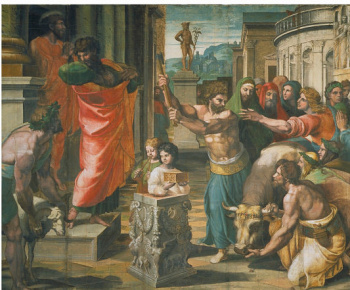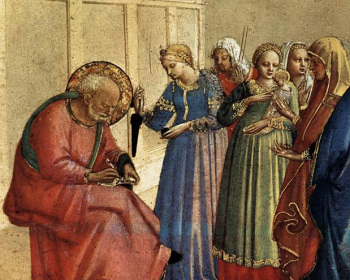Please see our listing for Dorcas.
Tertius is the person who wrote down the epistle to the Romans dictated to him. In the book, He sends greetings to his fellow Christians living in the empire's capital. Nothing more is known about him.
Tertullus was an orator who was likely a well-seasoned lawyer familiar with trying cases in Roman courts. He was chosen by the Jewish Sanhedrin to present their case against Paul before Roman procurator Felix in Caesarea. Paul was being kept in protective custody after a riot broke out in Jerusalem's temple that he was (wrongly) accused of starting.
The charges argued by Tertullus were, "we have found this man to be a pest, and a mover of insurrection among the Jews in the whole world, and a leader of the sect of the Nazareans; Who also attempted to profane the temple, and whom also we seized, desiring to judge him according to our laws" (Acts 24:5 - 6).
See our listing for Judas (Lebbeus, Thaddeus).
The name Theophilus means "lover of God." Luke dedicated both his gospel and the book of Acts to this person. Nothing more is known about the person. Luke's reference to him as "most excellent Theophilus" (Luke 1:3) could mean he was a person of rank or possibly a Roman officer.

Thomas (Didymus)
Matthew 10:3, Mark 3:18, Luke 6:15
John 11:16, 14:5, 20:24 - 29, 21:1 - 2
Acts 1:13 - 14
Thomas, one of the twelve apostles, is also called Didymus (the Greek equivalent of his name) in the KJV Bible (John 11:16, 20:24, 21:2).
The phrase "doubting Thomas" is sometimes used to refer to someone who requires proof before believing something. Its origin lies in Thomas' refusal to believe Jesus rose from the dead unless he saw him personally and placed his hand on his wounds (John 20:25).
Foxe's Book of Martyrs believes Thomas preached the gospel in Parthia and India. He then, according to the book, was martyred when pagan priests thrust a spear through him.
Timon was one of the first seven men, selected by the early church, to handle the daily distribution of food to the poor saints in Jerusalem. These men are commonly referred to as the New Testament's first deacons. Nothing more is known about Timon.
Timothy (Timotheus)
Acts 16 to 20, 1Thessalonians 1, 3
2Thessalonians 1, 1Corinthians 4, 16
2Corinthians 1, Romans 16, Hebrews 13
Philippians 1, 2, Colossians 1, Philemon 1
1Timothy 1, 6, 2Timothy 1
Timothy is born in Lystra to a father who is a Gentile but a mother who is a Jewess (Acts 16:1). Although his mother's lineage makes him a Jew, he is not circumcised at birth. This situation would later be rectified by Paul (verse 3).
Timothy first meets Paul during his second missionary journey visit to Lystra. When they meet, the apostle is about forty-eight years old while Tim is about thirty-three. He accompanies him on most of his remaining stops on this evangelistic tour.
Timothy also meets Paul in Ephesus during his third journey (Acts 19:22) where he will be sent to minister to churches in Macedonia. He is with the apostle during his first imprisonment in Rome.
Timothy, over time, became Paul's most trusted and closest friend in the gospel. The apostle treated him like a son (2Timothy 2:2 - 6) and firmly believed he was the only person he could trust to care for the churches with the same heart he possessed (Philippians 2:19 - 22).
The notation found at the end of 1Corinthians credits Timothy with helping to copy the epistle down on parchment. Timothy is also credited, in the endnotes of the book of Hebrews, with delivering this epistle to its destination.
Timothy, unlike many others, stayed faithful to Paul until the very end of his life. The book of 2Timothy, the last letter the apostle wrote, shows the faith and love he had for his friend and fellow laborer.
Titus
Galatians 2:1, 3, 2Corinthians 2:13, 7:6,
13 - 14, 8:6, 16, 23, 12:18, 13:14
Titus 1:4, 3:15, 2Timothy 4:10
Titus was a Greek (Gentile) convert to Christianity who was one of Paul's most trusted fellow laborers in the gospel. Interestingly, although he worked closely with the apostle, his name is not mentioned at all in the book of Acts.
His first recorded appearance connecting him with the apostle occurs when he accompanies him and Barnabas to the Jerusalem Conference (Galatians 2:1).
Titus, during Paul's extended stay in Ephesus, is sent to Corinth to handle the church's growing distrust and hostility toward the apostle. He meets back up with him in Macedonia to report their respect for him has been restored (2Corinthians 7:6 - 7).
Paul, after he is freed from his first imprisonment in Rome, reconnects with Titus to give him instructions regarding the church on Crete (Titus 1:4 - 5). Titus seems to have been loyal to the apostle to the end, evangelizing Dalmatia (Illyricum) during his final stay in Rome before martyrdom. Catholic tradition states Titus died sometime after he turned ninety.
Trophimus
Acts 20:4, 21:29, 2Timothy 4:20
Trophimus, a Gentile convert to Christianity, was one of a few people who accompanied Paul on his return trip from Corinth to Jerusalem during his third missionary journey.
Trophimus' arrival in Jerusalem was noticed by some of the city's Jews who knew he was not Jewish. When Paul visited the temple, the Jews thought he was bringing him into the temple, an act that was strictly forbidden. Their mistake, coupled with their already existing hatred of the gospel, was the catalyst for a riot that got the apostle arrested by the Romans.
Tryphena was one of the many Christians in Rome greeted by Paul in his epistle to the Romans. Both Tryphena and Tryphosa, who are females, are commended for their service to God.
Tryphosa was one of many important people in Rome greeted in the last chapter of Romans. Both Tryphosa and Tryphena, who are females, are commended for their service to God.
Tychicus
Acts 20:4, Ephesians 6:21, Colossians 4:7
2Timothy 4:12, Titus 3:12
The endnotes of the book of Ephesians state that Tychicus delivered the book to Ephesus. He also, along with Onesimus, took the book of Colossians to Colosse.
Urbane, who is a Christian living in Rome, is saluted as a fellow worker in the gospel. His name was commonly found among slaves. Nothing more is known of him.

Zaccheus, a short Jew, was the tax collector for Jericho. Like many of his fellow collectors, he was wealthy through theft, extortion and other means of dishonest gain (Luke 3:12 - 13, 19:7 - 8).
Desirous to see Jesus' arrival in Jericho he climbs a large tree. The Lord surprises Zaccheus by not only knowing his name but also declaring he we eat at his house! The notorious taxman then repents of his ill-gotten gains and promises to give back what he stole.
Zacharias was the husband of Elizabeth and father of John the Baptist. He was a priest of the Abijah division who served in Jerusalem's temple. According to the New Testament, both he and his wife were righteous elderly people who, before God's invention in their lives, were unable to bear any children.
In the middle of 6 B.C., during his service in the temple, Zacharias is visited by the angel Gabriel. He is informed that his wife will bear a child, named John, and that his mission would be to prepare the way for the Messiah. Zacharias disbelieves what he is told and is rendered mute until after John's birth.
Zenas was a Christian lawyer. Paul requested Titus, who was on Crete, to help Zenas with what he needed while traversing the island. Nothing more is known about him.